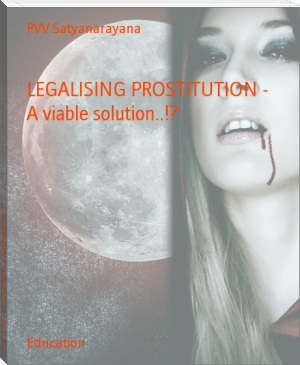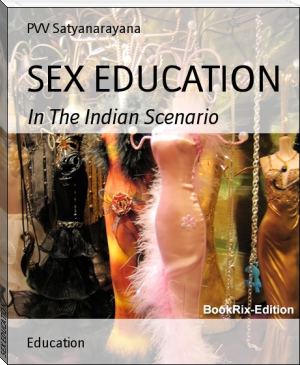LEGALISING PROSTITUTION - A viable solution..!? - PVV Satyanarayana (love letters to the dead TXT) 📗

- Author: PVV Satyanarayana
Book online «LEGALISING PROSTITUTION - A viable solution..!? - PVV Satyanarayana (love letters to the dead TXT) 📗». Author PVV Satyanarayana
LEGALISING PROSTITUTION – A Viable Solution?
Recently the Supreme Court of India has opined that legalizing sex trade would be a better option to avoid trafficking of women and commented that nowhere in the world has the trade been curbed by punitive measures.
The Apex Court was hearing a Public Interest Litigation on the large scale child trafficking in the country for forcing into prostitution, filed by an NGO, Bachpan Bachao Andolan, along with the intervention application moved by the Childline, another social organization.
The Bench comprising Justice Dalveer Bhandari and Justice A.K. Patnaik told the Solicitor General, Mr. Subramaniam, appearing for the Union Government: “When you say it is the world’s oldest profession and when you are not able to curb it by laws, why don’t you legalize it? You can then monitor the trade, rehabilitate and provide of medical aid to those involved in the trade’.
True, prostitution is an age-old ‘profession’ – if it could be called one! It had apparently started essentially as a ‘service’ to satiate the carnal needs of those deprived – assuming, over the ages, the dubious character of a ‘profession’, culminating into a large trade, al beit illegal and immoral, spreading its tentacles world-wide. The lucrative flesh trade has led to unchecked illicit human trafficking in women and children, making it unsafe for young girls and women.
While thousands of hapless women enter the trade to make their ends meet, several scores of thousands are forcibly dragged into it. Those who resisted faced mental and physical violence, or even death at the hands of the traffickers. These unfortunate women are also exposed to the dreaded diseases like the HIV/AIDS, besides the venereal diseases. The flesh trade in the country has been flourishing unabated despite the Immoral Traffic Prevention Act, 1956, and the successive governments have failed miserably in checking it.
Sustained efforts made by the government as well as several voluntary organizations have been proved to be inadequate to check the evil. The country’s laws have failed being ineffective as the perpetrators often get away with minor penalties/punishment. Sex industry in India allegedly involves over 3 million people including the traffickers and 30% of the victims are children. While about 90% of trafficking cases in the country are ‘intra-country’, 5-10% related to cross-border trafficking – mainly from Bangladesh and Nepal.
Human trafficking is said to have emerged as a booming illegal international trade making an estimated $32 billion annually, at the expense of millions of victims all over the world. Besides the physical trafficking, the advent of Internet too has contributed no less to the trade, compounding the problem. In fact, “the Internet industry exists today because of the prostitution industry”, as claimed by Donna Hughes in her book entitled, The Sex Industry And The Internet Industry. Now, the mobile phones too do not lag behind in adding to this complex problem.
Some of the countries like South Africa, Saudi Arabia, Sweden, the United States, etc., as also the neighbouring ones - Pakistan, China and Sri Lanka – have made prostitution illegal … while in others like Hong Kong, Belgium, Italy, United Kingdom, Spain, Canada, etc., there is no specific law prohibiting exchange of sex for money. In India too, prostitution as such is not illegal as also soliciting clients, but visiting the brothel for the purpose of sexual exploitation of trafficked victims is illegal and attendant with punishment under the ITP (Amendment) Bill, 2006. This provision seems ambiguous as it does not seek to clarify as to how a person could know whether the woman he was visiting was a trafficked one or not!
Some countries such as Austria, Germany, New Zealand, The Netherlands, Switzerland, Turkey, Venezuela, etc. have legalized prostitution and regulate it – unsuccessfully, though.
The experts seem to be clearly divided on the question of legalizing prostitution. Those opposing it say that the best way to prevent human trafficking and child prostitution is to prohibit the profession itself. Legalizing makes it socially acceptable to buy sex. It would lead to crime and abuse as they are still controlled by outside ‘pimps’. The experience of The Netherlands is proof enough of this, they point out. (Though the country regulated prostitution, it has failed to solve the severe problem of human trafficking due to the involvement of the ‘organized crime’ in sex trade).
According to Janice G. Raymond of Coalition Against Trafficking in Women International (CATW), some of the reasons why sex industry should not be legalized are: Legalization/decriminalization will promote sex industry…instead of controlling, it expands the trade…it increases clandestine, hidden, illegal and street prostitution as also the child prostitution…it does not protect women in the profession…increases demand for prostitution thereby leading to boosting motivation to men to buy women for the purpose in more permissible and socially acceptable settings…it does not promote women’s health, nor does it enhance her choice. It is further said that the women in systems of prostitution are against legalizing or decriminalizing it!
However, the advocates of legalizing prostitution appear to adduce more forceful argument, viz., it will allow ‘human, legal, economic, child rights including right to police protection, employment and health benefits, pensions, to form cooperatives and trade unions’. The pro-legalization campaigners also assert that ‘it is a woman’s right to choose this form of employment and not to be dependent on a single man; and also would not be forced to work in hidden places’. In the process they seem to be oblivious to the harm that could be caused to the social and moral fabric of the country.
Recently, the first meeting of the ‘South Asian Regional Cooperation on Human Trafficking’ (of which India is a Member) forged by the UN Office on Drugs and Crime (UNODC) was held at New Delhi, where the ‘Delhi Declaration’ was adopted, assessing the position and calling for more stringent and concerted efforts by the Member-countries to check the menace. The low conviction rate in India (of traffickers) was a concern to the UN and the other International Bodies – as only 6000 cases are registered every year in India, while the number of people convicted is 6341 in 2004 and 7075 in 2005. The emerging trend of male prostitution too is a cause for concern. The linkage between the sex trade and the drug industry is yet another worrisome factor for the governments.
It is in this context that the comments of the Supreme Court assume significance and provide food for thought - needing careful, thorough study of all the aspects of the issue. Those organizations that are striving to create awareness about HIV/AIDS and to prevent it, such as the National Aids Control Organization (NACO) and other non-profit, non-governmental organizations are sure to welcome the Apex Court’s suggestion.
If the prostitution were to be legalized in the country, it calls for strict regulation of the trade and more stringent checks and balances in order to protect the women and children and to effectively check the ‘organized crime’, which would now be armed with licenses. The women in the ‘profession’ should be subjected to personal counseling by social psychologists (and a meeting with a designated police official too will not be a bad idea!) at the time of initiation to the profession, to make sure that the women in fact are opting for it willingly and voluntarily – and are not forced into it. Besides, there should be periodical health check-ups. It should also be ensured that prescribed norms are diligently followed while entertaining clients so that the patrons are not at risk for sexually transmitted diseases (STDs).
These are the minimum precautions the government could contemplate before granting licenses to brothels. Any lackadaisical approach to the problem will only spell disaster. It is also worth studying the modules and experience of the countries like The Netherlands. Nevertheless, with the corruption rampant all over, to what extent these regulations could be effectively implemented, is a big question that would be staring at us!!
*****
Text: All rights reserved.
Publication Date: 11-08-2010
All Rights Reserved
Dedication:
To the hapless women and children.





Comments (0)